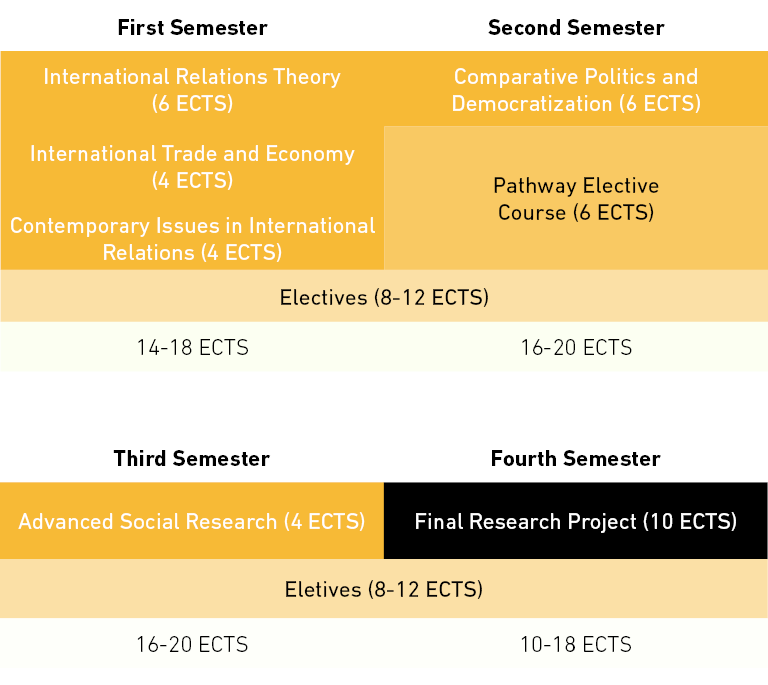Syllabus Part Time
The content of the part-time Master's in International Relations is basically the same as that of the full-time programme, but the syllabus is carried out at a different rate, since the programme lasts for two academic years (four semesters). The flexible part-time master’s enables students to combine their studies with other activities. Students have the possibility to participate in an academic exchange programme or to do an internship in their second year of study.
During their second semester of studies, students can choose one of the following five pathways:
- Conflict, Threats and Violence in Global Politics
- Global Governance
- International Environmental Politics
- International Political Economy
- Mediterranean Area Studies
In addition, IBEI is offering concentrations, suggested groups of four or five elective courses and a pathway course that combine to give a clear focus on one policy area or region. Students may choose how many of the electives to take, and may also choose freely from across all of the electives on offer.
|
Conflict in Global Politics | |
|---|---|
| Pathway: | Conflict, Threats and Violence in Global Politics |
| Semester 1 elective: | |
|
Semester 2 electives: |
Peace Processes and Conflict Resolution Seguridad Internacional y Fuerzas Armadas The politics and practice of international humanitarianism |
|
Governance and Diplomacy | |
|---|---|
| Pathway: | Global Governance |
| Semester 1 elective: |
International Relations of Global Cities The BRICS and the Global Power Shift |
|
Semester 2 electives: |
Politics of International Sanctions Foreign Policy, Diplomacy and Globalization International Relations in Latin America International Relations in Asia International Relations of the Middle East Foreign and Security Policy of the Russian Federation Complex Governance of Global Challenges Politics of International Organizations Science Diplomacy |
|
Environment and Sustainability | |
|---|---|
| Pathway: | International Environmental Policy |
| Semester 1 elective: |
Understanding Development: theory and practice Programme Evaluation in Development |
|
Semester 2 electives: |
Development, Environment and Natural Resources Natural Resources and Armed Conflicts Geopolitics of Energy |
|
Global Political Economy | |
|---|---|
| Pathway: | International Political Economy |
| Semester 1 elective: |
European Union Political Processes Political Economy of Welfare State Data Analysis for International Relations |
|
Semester 2 electives: |
International Business and Economic Institutions Game Theory for International Relations |
|
The Politics of the MENA Region | |
|---|---|
|
Pathway: |
Mediterranean Area Studies |
|
Semester 1 electives: |
|
|
Semester 2 electives:
|
International Relations of the Middle East |
The part-time Master's in International Relations is structured into three semesters of compulsory courses and electives (studying a total of 50 ECTS credits), taught by highly-qualified academics linked to the three universities that jointly offer the degree, as well as to other prestigious international institutions, and a fourth semester dedicated to carrying out the Final Research Project (10 ECTS credits).
Students will obtain 15 ECTS per semester. The total of the 60 ECTS is allocated as follows:
- Compulsory courses: 24 ECTS (depending on studies carried out previously, it may be possible to exchange one or more compulsory courses for an equivalent or higher number of credits in electives)
- Pathway elective courses: 6 ECTS (At least three pathway core courses will be offered during the afternoon schedule).
- Electives: 20 ECTS. A minimum of 40 ECTS in electives will be offered in the afternoon schedule, throughout the two years of the programme.
- Final Research Project: 10 ECTS
Syllabus (two-years, part-time option)

For more information about the course enrolment process, please click here.
Timetable
Classes take place in the afternoon from 4pm to 9pm (September to June).
At least three of the pathway elective courses will be offered in the afternoon schedule. Part-time students can also choose electives taught in time slots other than those offered during the afternoon period.
